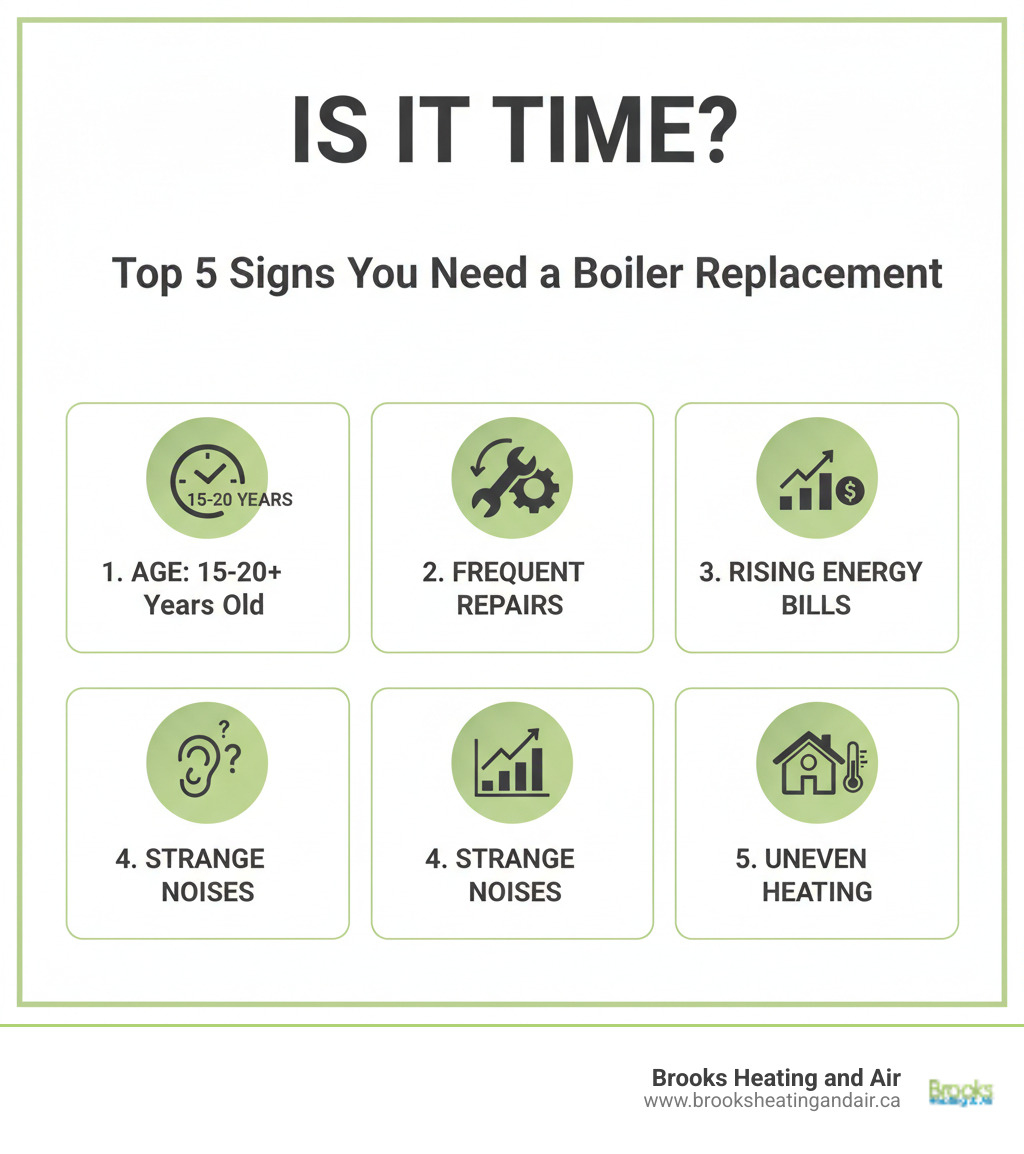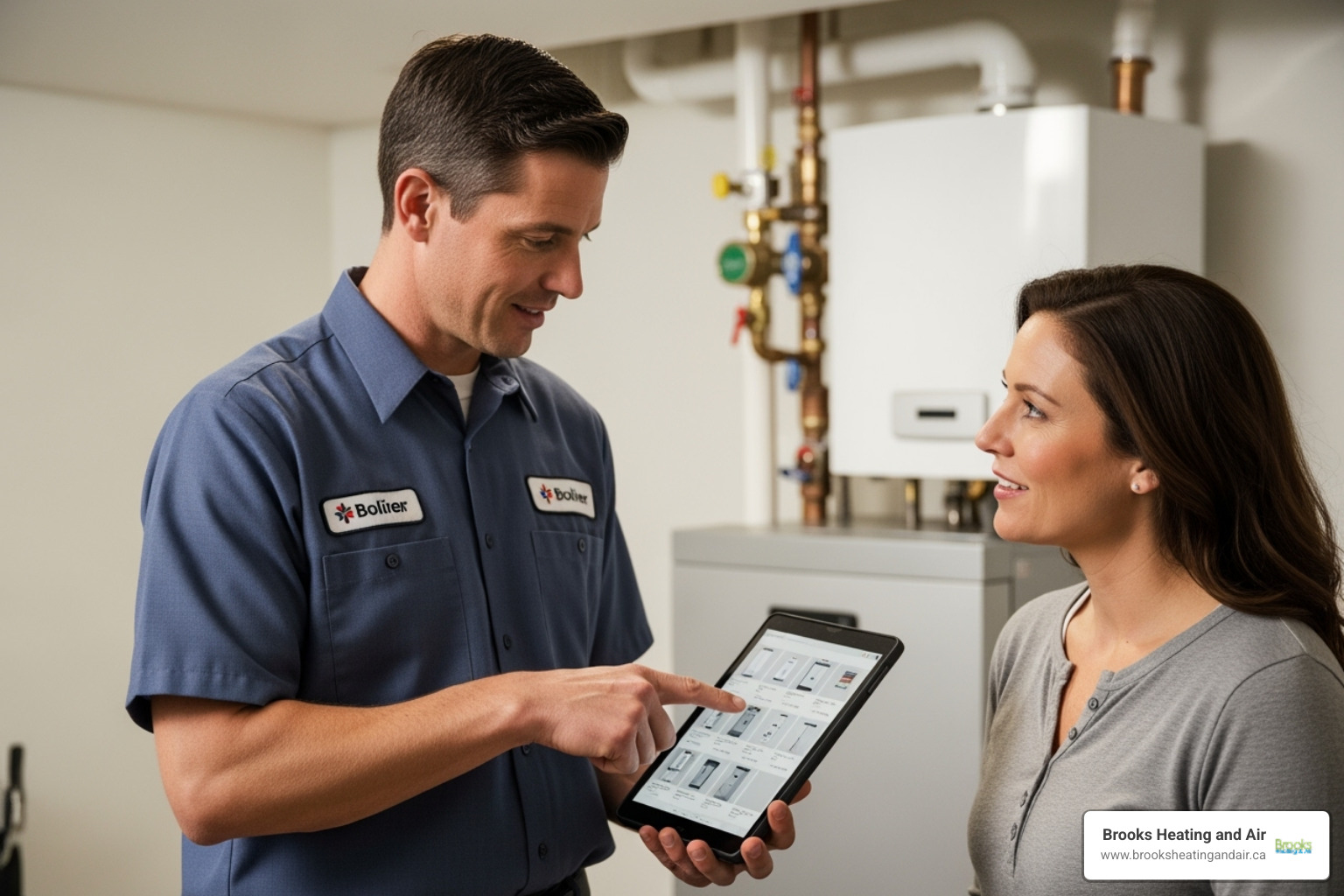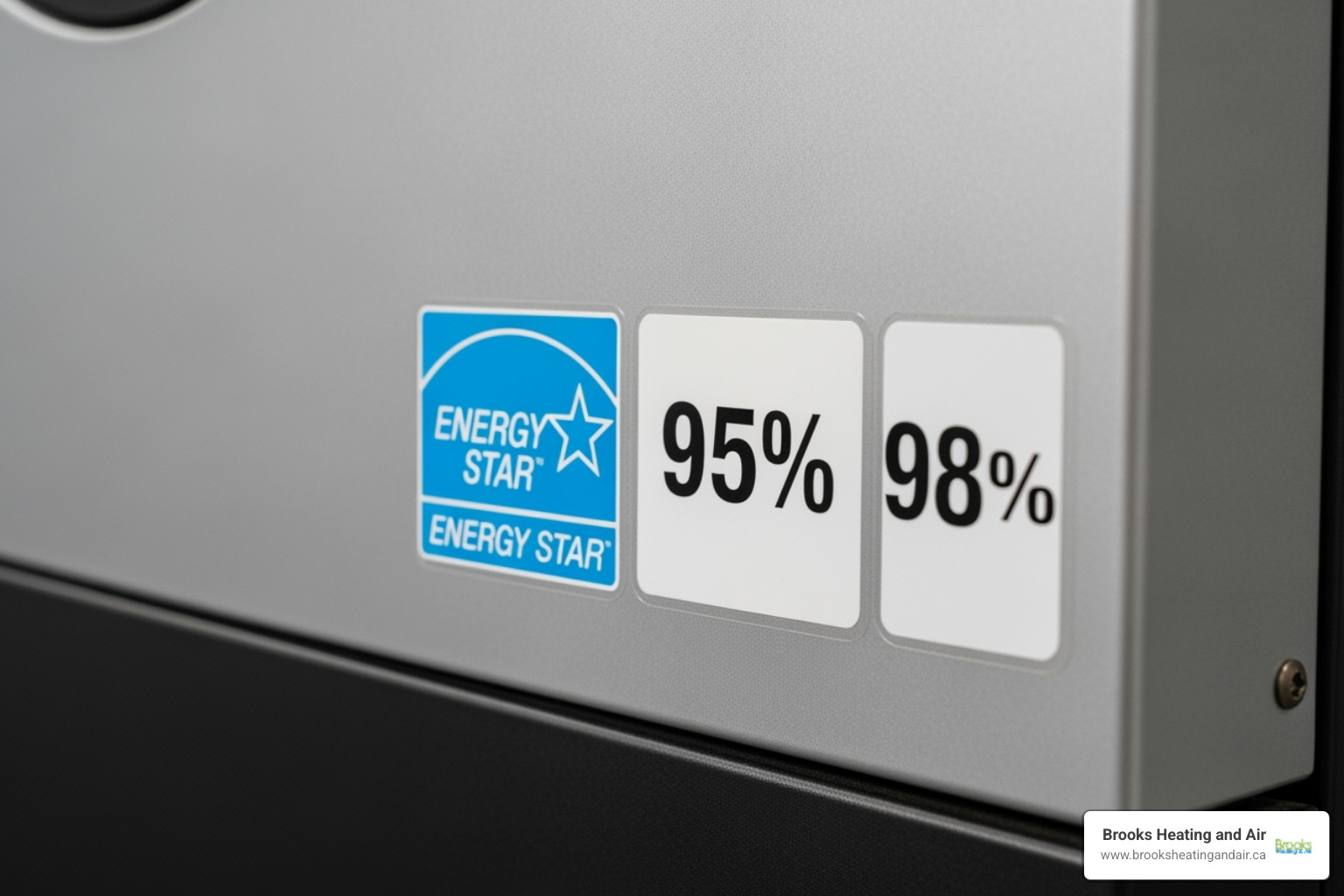Don't Get Burned: Understanding Your Boiler Replacement Cost Estimate
Is It Time for a New Boiler?
Thinking about replacing your boiler in Georgetown, Milton, or Halton Hills? A properly selected and installed system restores comfort, improves efficiency, and provides reliable heat during Ontario winters.
Most boilers last 15-25 years with proper maintenance. When yours starts showing its age, planning your replacement proactively keeps your home comfortable and avoids mid-winter surprises.
You might be seeing warning signs already: rising energy use despite similar heating habits, strange noises, cold spots, more frequent repairs, or advice that your unit is nearing the end of its service life.
These issues signal declining efficiency and reliability. A modern boiler can run quieter, improve comfort room-to-room, and reduce energy consumption. Many models may also qualify for available energy-efficiency incentives.
What many homeowners don’t realize is that the ideal replacement depends on home-specific factors. A professional, in‑home assessment ensures correct sizing, venting, and integration with your existing distribution system so everything works properly from day one.

When you start noticing a Boiler Burning Smell, leaks, or persistent uneven heating, it’s a strong indicator that your system is struggling. These symptoms are not just about comfort; they speak to the overall Role of Boilers in Home Heating and Energy Efficiency and the importance of regular Boiler Maintenance in Georgetown. Catching these signs early helps you plan your replacement on your schedule.
Key Factors That Shape Your Boiler Replacement Plan
When you're planning for a new boiler, the decision isn't just about the equipment on a brochure. Your replacement plan depends on several interconnected factors that determine the right solution for your home.

Boiler size is the foundation of everything else. Heating capacity (BTUs) must match your home's needs—neither too much nor too little. Square footage offers a baseline, but it's only the start.
Your home's square footage and Ontario's climate zone help set the target, but we also look at insulation levels, window quality, air leakage, and layout. In our region's genuine winter cold, precise sizing is essential for consistent comfort.
Professional installation is critical to performance and safety. It's not just connecting pipes—it's confirming proper venting, combustion air, controls, and system protection so your home stays comfortable and your equipment performs as designed.
Installation complexity varies. A straightforward like-for-like swap is the simplest scenario. Switching from oil to gas, or upgrading to a high-efficiency combi, can require new venting, piping changes, electrical updates, or integration with radiant floors and indirect tanks. Added steps like these shape the project scope and timeline.
Don't overlook local codes and permits. Whether you're in Georgetown, Milton, or Halton Hills, municipal and provincial requirements govern boiler work. A reputable contractor handles the permits, inspections, and documentation for you.
How Boiler Type and Fuel Source Impact Your Choice
Your fuel type influences day-to-day convenience and maintenance. Understanding the differences helps you choose what fits your home and location.
Gas boilers are common across Ontario where natural gas service is available. They offer strong efficiency and convenience without on-site fuel storage. The combustion process is clean and controlled, with modern units featuring sealed combustion chambers that draw air from outside rather than your living space. This design improves both efficiency and indoor air quality.
Oil boilers remain a solid option in rural areas without gas lines. They deliver reliable heat but require an on-site storage tank and regular deliveries, plus a bit more maintenance due to soot from combustion. Modern oil boilers have improved significantly in efficiency, with some models approaching the performance of gas units. The oil tank placement needs careful consideration—whether indoors or outdoors—to meet local regulations and ensure safe, convenient access for deliveries.
Electric boilers are compact, clean, and quiet, with no combustion or venting requirements. They're well suited for smaller homes, spaces without venting options, or as supplemental heat. While electricity rates in Ontario can be higher than gas, electric boilers offer nearly 100% efficiency since there's no heat loss through exhaust. They also require minimal maintenance since there are no combustion components to service.
Propane boilers serve homes beyond the natural gas network. Propane burns cleaner than oil, with on-site tank storage and scheduled deliveries similar to oil. The higher energy content of propane compared to natural gas means you'll use less volume for the same heat output, though storage tank sizing becomes an important consideration for maintaining adequate supply through winter.
Switching fuel sources—say, from oil to natural gas—may involve gas line installation, oil tank removal, updated venting, or a chimney liner. Your in-home assessment will outline these steps so the project is planned correctly from the start. Tank decommissioning must follow environmental regulations, and new gas service requires coordination with your utility provider.
Here's what you need to know about each fuel type:
Natural Gas offers consistent supply through utility lines and efficient combustion. The key consideration is whether service is available to your property. Gas boilers typically have lower operating expenses than oil or electric options, and you'll never worry about running out of fuel during a cold snap. Modern condensing gas boilers can achieve efficiency ratings above 95%, extracting nearly all available heat from the combustion process.
Oil provides high heat output and works well where gas isn't available. Plan for tank placement, periodic deliveries, and regular maintenance. Oil prices can fluctuate more than natural gas, so many homeowners budget for annual service contracts that include cleaning and tune-ups. The combustion process requires annual cleaning to remove soot buildup and maintain efficiency.
Electric runs clean and quiet with compact equipment and no flue. It's often best for smaller loads or specific applications where venting is a challenge. Electric boilers work well in condominiums or heritage homes where adding venting would be difficult or prohibited. They're also ideal for radiant floor heating systems where precise temperature control is important.
Propane burns cleaner than oil and suits rural locations without natural gas. As with oil, you'll manage tank storage and delivery schedules. Propane systems can often use the same equipment as natural gas with minor adjustments, making future conversions simpler if gas service becomes available. Tank rental programs from propane suppliers can reduce upfront investment.
How to Plan Your Boiler Replacement Smoothly
- Request multiple detailed proposals from reputable contractors so you can compare equipment options, scope of work, permits, and timelines. Each proposal should include equipment specifications, warranty details, and a clear breakdown of what's included in the installation.
- Plan ahead—shoulder seasons (spring/fall) often offer more scheduling flexibility and help you avoid emergency downtime. This timing also allows you to address any unexpected issues without the pressure of winter approaching.
- Check current Energy Rebates and efficiency programs in Ontario; offerings change over time. Some programs require pre-approval before installation, so research early in your planning process.
- Some high-efficiency models may be eligible for ENERGY STAR resources and incentives. Review eligibility details when choosing equipment.
- Consider your home's future needs—if you're planning renovations or additions, factor these into your boiler sizing calculations now rather than finding your new system is undersized later.
- Document your current system's performance issues and energy consumption to help your contractor understand your specific concerns and goals for the replacement.
- Prepare your mechanical room for the installation by clearing access paths and removing stored items that might interfere with the work or new equipment placement.
Understanding Boiler Efficiency and Capacity
When you're exploring your boiler replacement, two terms will come up again and again: efficiency and capacity. These directly impact your family’s comfort and how much fuel your system uses.

Think of your boiler’s AFUE (Annual Fuel Utilization Efficiency) rating as a report card for how effectively it converts fuel into heat. An 85% AFUE boiler uses about 85% of the fuel’s energy to heat your home, with the rest lost through the exhaust or other inefficiencies. Learn more about What is AFUE?.
Standard-efficiency models (typically 80–89% AFUE) and high‑efficiency models (90%+ AFUE) achieve comfort in different ways. High‑efficiency condensing boilers capture heat that standard units vent away, helping reduce fuel use while delivering steady comfort.
The right balance depends on your home, comfort goals, and how long you plan to stay.
Sizing Your Boiler: A Critical Part of the Plan
Sizing matters as much as efficiency. We’re talking about heating capacity, measured in BTUs—not the unit’s physical dimensions.
An oversized boiler heats too quickly and then shuts off, leading to frequent on/off cycling that wastes energy and increases wear.
An undersized boiler runs nonstop and may struggle on the coldest days, leaving rooms underheated.
Proper professional heat‑loss calculations consider square footage, ceiling heights, insulation, window performance, air leakage, orientation, and more.
Insulation levels are especially important: a well‑insulated 2,000‑square‑foot home may need less capacity than a poorly insulated 1,500‑square‑foot home. Window and door quality matter, too; leaky, older units lose heat much faster than modern, energy‑efficient ones.
Two similar houses on the same street can require different sizes. Every home is unique, and accurate sizing is essential to comfort and reliability.
A Deeper Look at Boiler System Types
Beyond fuel and efficiency, choose a system style that fits your space and hot water needs. The three common options are conventional, combi, and system boilers.
| Boiler Type | Installation Considerations | Space Requirements | Hot Water Performance |
|---|---|---|---|
| Conventional | Requires both cylinder and cold water tank; more complex installation | Largest footprint; needs space for cylinder and cold water tank (often in attic) | Excellent for high demand; stored hot water supports multiple taps at once |
| Combi | Simpler installation; no tank | Most compact; all‑in‑one unit saves significant space | Good for moderate demand; may struggle with multiple simultaneous uses; instant hot water with flow rate tied to mains pressure |
| System | Cylinder required but no cold water tank | Medium footprint; needs cylinder space but no attic tank | Strong performance for higher demand; maintains pressure for multiple outlets; faster recovery than conventional |
The right choice depends on your home’s size, your family’s hot water habits, and available space. During an in‑home assessment, we’ll help you decide which configuration aligns best with your needs in Georgetown, Milton, or Halton Hills, and ensure it’s set up for safe, efficient operation.
Customer Testimonials

Fantastic Company and Service. We needed a new dryer vent last minute and they came the same day we called. They offered tremendous service and did a very professional Job. The Two Young Gentleman had a good attitude and were a pleasure to deal with. Thanks!

Wonderful service call with Andrew. He was helpful knowledgeable and did a great job explaining the issues. We have finally signed up for the service plan and would like to have Andrew back for the repair on the fireplace and the furnace service.Amazing service today. Thank you. We are very pleased with our experiences with Brooks.

Chris and Jared replaced our furnace and air conditioner just before Christmas. It was an excellent experience. They did a very thorough job of removing the old units and installing the new ones and everything was left neat and tidy and "done right." Thanks Chris and Jared, much appreciated! We'll be keeping Brooks Heating and Air in our contact list. We rate them A+.

Big thanks to Jacob! He came to our rescue after hours in an emergency, when our furnace broke down, in a very speedy manner. He explained everything in detail and fixed the problem for us expertly!
I highly recommend Brooks, and Jacob.
Thank you so much for giving us peace of mind, and heat again! 😊

We have been customers of Brooks Heating and Air for years, and they came through as always when we needed our air conditioner replaced. In less than 48 hours from our initial call, we had a new AC unit installed. Chris came by and answered all of our questions and had the crew come out the next day for the install. They were prompt, courteous, friendly and professional (as always). We couldn’t be happier with our experience. Thanks to the Brooks team for the wonderful service!

Flexible Financing Options for Your Needs
At Brooks Heating & Air Inc, we offer a variety of financing plans tailored to fit your budget. Whether you need short-term solutions or long-term investments, we have options that make it easier for you to manage your HVAC system needs.






